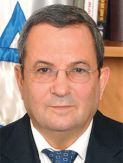Israel’s most highly decorated military officer likes to pick locks, which put Ehud Barak in good stead for navigating the inner-workings of Israel’s political system.

Ehud Barak
In 1999 Barak became prime minister less than five years into his political career, launched in 1995 when he retired as a lieutenant general, the highest rank in the Israeli army. His 36-year military career was stellar: he served as a head of military intelligence and chief of General Staff for the Israel Defense Forces (IDF). Once Barak started in politics, he held multiple cabinet posts before becoming prime minister for the Labor Party. He was named Minister of Defense in 1999 and served a second stint from 2007 to 2013.
Rather than the early path a politician might take, Barak’s education is in math and science. In 1968 Barak received a Bachelor of Science in physics and mathematics from Hebrew University. When the IDF was about to send him for training to the US Marine Corps Command and Staff College in Quantico, Barak instead convinced his superiors to let him go to what he called a “normal” university. He selected Stanford University "for the weather" over his other choices, MIT or Harvard. He earned an M.S. degree in economic engineering systems from Stanford in 1978.
Born in 1942 on a kibbutz in what later became northern Israel, Barak may well have been influenced as many young kibbutzim of his generation brought up to believe in serving a bigger destiny for Israel. When he was drafted to the IDF in 1959, he changed his family name from Brog to the Hebrew word for lightning, “Barak”.
Lightning well describes Barak’s career as a soldier and a politician. It is also an apt metaphor for his intellect. Brilliance is frequently noted about Ehud Barak. Likened to his mentor Yitzhak Rabin, Barak is known for his analytical mind. Professor Ehud Sprinzak, a political scientist at Hebrew University wrote, "Barak is brilliant, sophisticated, a long-range strategic thinker."
Barak had a front row seat for the cooperation that emerged between two powerful rival figures in Israeli politics, Yitzhak Rabin and Shimon Peres, as they united towards a peace process with the Palestinians. Barak told Charlie Rose that he saw the two leaders remain vividly cognizant of their disputes yet each deciding that pursuing secure peace for Israel was something in their grasp to be accomplished, much bigger than any one of them as individuals. And Barak says they decided it could only be done through their own cooperation and leadership because they had the political capital to invest in peace; “sometimes you have to pay the price before you see the fruits of agreements.”
Barak himself was directly involved in Israel’s 1994 peace treaty with Jordan and met with his Syrian counterpart in Damascus. Barak also had an important role in implementing the Oslo Accords as he was in charge when Israel redeployed in parts of the West Bank and Gaza as called for in the agreement. He contends his experience as a military commander provides a valuable backdrop for his understanding of politics. He is quoted as saying, “People ask me very often if I am a pessimist or an optimist...Usually in the Middle East, we tend to say a pessimist is an optimist with experience.”
Ehud Barak is not reluctant to dive into the fray, whether on a military mission he commanded, taking Israel’s highest offices, or publicly disagreeing with Israel’s current prime minister, Benyamin Netanyahu. In an opinion piece as recently as last month in the Washington Post, Barak expressed the view that the prime minister is recklessly undermining Israeli security, and he criticized Netanyahu for significantly damaging Israel’s relationship with Washington. Barak is outspoken on what he considers fear-mongering by the prime minister and his Likud Party by exaggerating regional threats to Israel’s security. “The Middle East is a tough neighborhood. Hezbollah, Hamas, the Islamic State and a more potent Iran are not imaginary adversaries. Yet as a former prime minister, defense minister and Israel Defense Forces chief of staff, I state unequivocally: While never to be taken lightly, none of these forces constitutes an existential threat.”
Barak has a romantic side that extends beyond his prowess playing classical piano: he surprised everyone when he reunited with his childhood sweetheart, Nili Priel. In 2007, the two married more than 40 years after they’d first met. Maybe this time Israel’s highest ranking general picked an emotional lock.